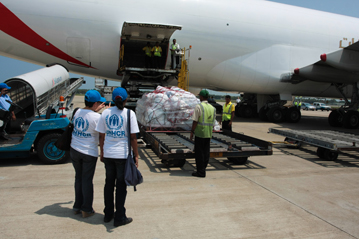UNHCR beefs up presence near Bogota, sends mission to north
UNHCR beefs up presence near Bogota, sends mission to north

BOGOTA, Colombia, Dec 3 (UNHCR) - The UN refugee agency has sent a team to north-western Colombia's Chocó province to assess the situation of people displaced by recent fighting. It is also establishing a regular presence south of Bogota to better assist people uprooted by the civil conflict.
On Thursday, a UNHCR team was deployed to Bebedó locality in Chocó province's Middle San Juan River area to assess the situation of hundreds of Colombians affected by heavy clashes that broke out between paramilitaries and guerrillas of the Revolutionary Armed Forces of Colombia (FARC) last week.
The fighting left at least 12 people dead and 13 people wounded. Most of Bebedó's estimated 800 residents tried to flee but were stopped by one of the irregular armed groups. The 127 people who managed to escape are now living in a cultural centre or with local families in the nearby towns of Andagoya and Istmina.
Further north in the province, in Bojayá, "the situation continues to be critical, with indigenous communities still blockaded by irregular armed groups," said UNHCR spokeswoman Jennifer Pagonis at a news briefing in Geneva on Friday. "There are worries that with the onset of the dry season in December-January, new clashes between armed groups will ensue."
UNHCR will lead a joint mission with the International Organization for Migration, the World Food Programme and the Colombian government's Social Solidarity Network next week to build community centres in several returnee areas in the Bojayá area. These centres can also be used for emergency accommodation in case of influxes of internally displaced persons (IDPs).
In an unrelated incident on Monday, a fragmentation grenade exploded about 50 metres from UNHCR's office in Quibdó, the provincial capital of Chocó. At least three people were killed and another six injured. No UNHCR staff were hurt and the office was not damaged by the blast, for which no group has claimed responsibility.
Bogota, meanwhile, continues to host the highest concentration of IDPs escaping violence in the countryside. Government registration figures say there are some 86,000 IDPs in the capital while non-governmental organisations estimate there are close to 210,000. Most of the displaced people live in the poor neighbourhoods of Ciudad Bolivar and Altos de Cazucá, where UNHCR and other agencies have expressed concern about the grave human rights situation.
"The IDPs have asked for a more regular international presence to help them feel safer in an area plagued by murders and human rights abuses, and where irregular groups have been accused of conducting a campaign of terror and intimidation against the local population," said Pagonis.
Starting this week, UNHCR is establishing a regular presence in Altos de Cazucá, home to an estimated 25,000-30,000 IDPs. "The presence will allow UNHCR to better respond to the protection needs of the IDPs and to expand our existing work in Altos de Cazucá," said Pagonis.
Currently, the refugee agency is involved in documentation campaigns that have delivered identity documents to some 3,000 IDPs in Altos de Cazucá. Other projects include training teachers to better meet the needs of IDP children and legal aid centres run by UNHCR and the National University to help IDPs exercise their rights.
In the Altos de Cazucá municipality's Soacha city, UNHCR has started to assist the mayor and the Social Solidarity Network by training officials from the city's Assistance and Orientation Unit for Displaced Population on subjects such as human rights and micro-credit schemes. The refugee agency is also participating in setting up an IDP information centre organised by the Soacha mayor's office in Altos de Cazucá.
"Other United Nations agencies (UNICEF, OCHA, UNDP and WFP) have expressed their interest in joining UNHCR in Altos de Cazucá," noted Pagonis. "If they do join in, it would be the first time in Colombia that most of the UN agencies in the country would share a common space at the field level in order to face jointly the humanitarian challenges."









